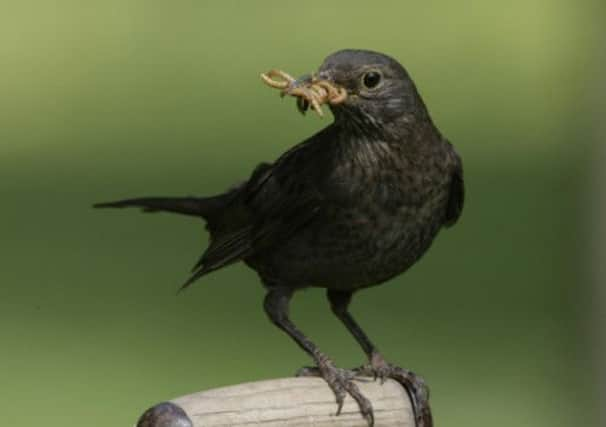Blackbirds living in cities ‘less robust’


And new Scottish research has found birds that live in cities may also fall off their perches sooner than their rural counterparts because of the faster pace of life.
Blackbirds living in urban areas go to sleep later and rise earlier than those in the countryside because their biological clocks are ticking faster, a new study published today found.
Advertisement
Hide AdAdvertisement
Hide AdExperts at the University of Glasgow said their findings were the first scientific evidence that living in large human settlements has a significant impact on the body-clocks of wild animals.
They suggested the birds were displaying “micro-evolutionary” changes in response to the artificial stimuli of urban life, such as increased light and noise.
The study raised concerns that, just like city people who suffer serious health issues because of lack of sleep, blackbirds and other wildlife could also be affected by more health problems, which could shorten their lifespans.
Dr Barbara Helm, of the University of Glasgow’s Institute of Biodiversity, Animal Health and Comparative Medicine, said: “We found the rhythms of urban birds in the wild differ significantly from forest counterparts.
“On average, they began their daily activities about 30 minutes before dawn, while forest birds began their day as the sun rose. The city birds ended their days about nine minutes later [than forest birds], meaning they were active for about 40 minutes longer each day.
“In constant laboratory conditions, urban birds’ circadian rhythms were clearly altered, running faster by 50 minutes than forest birds and being clearly less robust. There seems to be a different beat to city life.”
She added: “Previous research undertaken by other researchers has suggested strong links in humans between disrupted sleep patterns and an increased incidence of depression and diseases including some types of cancers.
“Our work shows for the first time that when sharing human habitats, a wild animal species has a different internal clock.”
Advertisement
Hide AdAdvertisement
Hide AdThe daily cycles of activity and rest animals follow are based on biological rhythms, which have evolved in response to the rising and setting of the sun.
The research, published in the journal Proceedings of the Royal Society B, was conducted with experts at the Max Planck Institute for Ornithology in Germany.
Experts monitored several dozen adult male European blackbirds, some captured in Munich and some in a forest. Each bird was fitted with a lightweight radio transmitter to monitor daily activity levels and then released for ten days before being recaptured.
Scientists held the birds in light-proofed, sound-insulated chambers to measure their circadian rhythms under constant conditions, without any environmental information that could affect their clock.
Once the tests were completed, the birds were returned to the wild.
Researchers hope to carry out further studies to assess the costs and benefits of changing biological rhythms in blackbirds and other animals found in cities.
Commenting on the possible evolutionary impacts being observed, Davide Dominoni of the Max Planck Institute – who is also affiliated to the University of Glasgow – said: “For songbirds, early risers may have an advantage in finding a mate and thus a greater chance of successfully producing offspring and passing along their chronotype [a measure of how active an animal is in relation to the time of day] to the next generation.
“Other research has shown chronotypes are highly heritable, so the process of natural selection could mean city birds are evolving to favour early risers.
“Obviously a great deal of further work would be needed to test this hypothesis, but we believe it certainly merits further study.”